- Home
- Anne Stuart
Blue Sage (Anne Stuart's Greatest Hits Book 3) Page 3
Blue Sage (Anne Stuart's Greatest Hits Book 3) Read online
Page 3
“How long have you been working here?” he countered.
Lonnie kept his hand out. “I’ve been editor for the last fifteen years. Ever since my father died in the massacre.”
No help from this quarter, Tanner thought glumly. “I think I’ll just head out there on my own,” he said, still ignoring the hand. Lonnie wouldn’t thank him for shaking it, once he knew who Tanner was.
That moment was about to come. “Listen, it’s no trouble,” Lonnie said. “I’ll just close the office. We’re always ready to welcome strangers. We don’t see them very often, Mr....?”
Tanner just looked at him. “I don’t think you’re ready to welcome me,” he said, his voice deep and raspy. “And the name’s Tanner.”
Lonnie Olafson didn’t move. He blinked, looked startled and flinched, as if someone had thrown an invisible pie in his face. He didn’t move as Tanner walked from the office, the heavy pack over his arm. He just stood there, staring after Tanner, his face a complete blank.
Davidson’s Market was open, with a couple of desultory shoppers and three bored old men leaning against the sparsely stocked shelves and gossiping. At least it had a state liquor license. He bought a pack of Camels, a bottle of whiskey, a loaf of bread, a pound of bacon and a dozen eggs. He ignored the polite questions, the curious glances, the friendly suspicion that followed him around the tiny store. He was paying for his purchases with a crumpled twenty when he heard her name. It was all he could do not to look up.
“I hear Ellie’s gonna go on a cruise,” one withered old man said, his eyes trained on Tanner’s figure.
“So she says,” the skinny lady behind the cash register replied, her own eyes just as avidly surveying the newcomer. “She won’t go. Something’ll come up, someone’ll need her, and she’ll stay. She’s got roots, has Ellie. She’s not one of your jet-setters. She knows where she belongs.”
“Think she and Fred will make a match of it?” the old man continued.
“Don’t know. It’s not as if she’s got any better choices. There ain’t a single man under fifty in this town besides poor Lonnie.” She let her dark, raisin-like eyes sweep over Tanner’s dusty figure. “How about you, stranger? Are you single?”
He dropped the twenty on the scarred wooden counter. “Got any matches?” he said, ignoring her question.
The woman shrugged, putting down a couple of books beside the twenty. “Just being sociable, mister. We don’t see strangers too often around here.”
That was the fourth or fifth time he’d heard that. He was getting sick of the curious eyes, the friendliness that he knew was going to fade into hatred and distrust. “I’m not a stranger,” he said flatly. “I’m Charles Tanner.” And gathering up his purchases, he walked out of the store.
* * *
Chapter Three
* * *
Ellie shook three aspirin tablets from the bottle over the old metal sink, poured herself a glass of acrid-tasting water and swallowed the pills. Only for a moment did she long for something stronger to wipe out the ache in her knee, not just to dull it. But she’d spent too many years wiping out pain, years that she’d spent placid, accepting, immured in this house and this town. It was only after the Judge had died that she’d taken a long, hard look at herself, at the gentle haze she’d kept surrounding her. She’d flushed the Demerol down the toilet and gritted her teeth, prepared to endure. And endure she had, with hot baths and aspirin and determination, anything to break the emotional and physical dependency that had ruled her life for too long.
She was almost free. Once the memorial was dedicated, then she could leave. The Judge had left her more money than she’d ever need—he’d been a careful man and hadn’t suffered from the latest hard times. She had enough to live on, particularly if she got a job, and still could leave the majority of it behind. She could set up some sort of trust, leave the house to the town, and take off. It wasn’t too late to go to college. Somewhere near a city, she thought, with a place for the horses. Surrounded by masses of people who, if they ever heard of Charles Tanner’s bloodbath, had long ago consigned him to the company of nightmare figures like Richard Speck and Charles Manson.
And she’d never go back. Not even to visit her father’s grave, not even to visit the Judge’s mausoleum. Every week she made her pilgrimage, with half the town following her, taking flowers to the victims. She’d brought enough flowers to last them through eternity. She didn’t think her father would care. She no longer had to please the Judge.
Her thick hair was a cold, wet bun at the back of her neck. The hot bath hadn’t helped her knee much, and it hadn’t helped her restless, anxious state of mind at all. Tanner must have arrived in town by now. The Judge’s huge old house was only one block back from Main Street, only a few hundred yards from the town park. If they’d decided to lynch Tanner on the site of his father’s crime she would have heard them.
Morbid thought, she chided herself. No one was going to lynch a stranger just because he bore the wrong name. And the wrong genes. These people were civilized.
Still, things had been tense during the last few months. Ellie had blamed it on the memorial, on the milestone anniversary rapidly approaching. A day didn’t pass without someone mentioning the massacre. Though to be honest, a day hadn’t passed in fifteen years without someone mentioning it. But in recent months an edge had crept back, a paranoia spread through the town, making people lock their doors, cast furtive glances over their shoulders and keep to their homes after dark.
Two more weeks, Ellie promised herself. Then it would all be over, and she could make plans to leave.
She moved slowly through the huge dark house, the gold-headed cane clutched tightly in her hand. She couldn’t rid herself of the suspicion that things weren’t going to be that easy. The unexpected appearance of Charles Tanner’s son was going to complicate matters even more.
She sank down in the straight chair and reached for the telephone. It was the only phone in the house, stuck in the middle of the hallway and not conducive to leisurely conversations. She’d always planned to have a phone jack put in her bedroom, or one in the slightly more comfortable living room, or maybe even one in the kitchen. But she never had.
Richard Barlow didn’t believe in employing an answering service or a receptionist. He was a doctor of the old school, one who believed in house calls and tender loving care. He answered on the first ring, his gruff, friendly voice momentarily wiping out Ellie’s fears. He’d been the one to help her get off the painkillers, he’d held her hand through the long nights and never told a soul, not even his daughter Ginger, who was the closest thing to a best friend Ellie possessed. He was the one person she could turn to in times of need. Something told her that was right now.
“Doc?” she said. “I need your help.”
* * * * *
Tanner could feel the eyes burning into the back of his neck. It didn’t matter that he was long out of sight—those angry eyes followed him.
They’d gathered in a little crowd at the end of the main street, watching him as he walked out of town toward the dead-end road that held what remained of his father’s ranch. He didn’t look back, didn’t quicken his even, long-legged pace, didn’t exhibit any signs of nervousness or even awareness of the hostile presence behind him. But he was more than aware of them. Part of him was begging someone to start something. A sheer, healthy rage was filling him. It had started with Ellie Lundquist, and each successive citizen of Morey’s Falls had added to it, until he was spoiling for a fight.
But they had only watched, in sullen, distrustful silence, as he headed out Town Road 5. He just hoped he’d find what he was looking for.
It wouldn’t be a big deal if he didn’t. He’d spent a good part of his adult life camping in the wilderness—he could easily spend another night or two until he located what remained of the Tanner family homestead. He certainly wouldn’t expect help from anyone.
He heard the truck from a long ways away. Lonnie Olafson ha
d said this was a dead-end road—no one would be driving out this way unless they were looking for trouble. Or looking for him. Right now maybe the two were synonymous.
The truck was coming up on him, slowing down. At least it wasn’t going to run him off the road, Tanner thought grimly. Hell, he wasn’t used to being so damned paranoid. He still couldn’t rid himself of the suspicion that the pickup was full of gun-toting vigilantes.
He wouldn’t be able to run, and when you were in that kind of trouble the worst thing you could do was to show fear. He stopped as the truck pulled up beside him, turned and faced the occupant with a deliberately blank expression on his face.
It was a middle-aged man, with a shock of thick gray hair, clear glasses and surprisingly kind eyes. He must not know who I am, Tanner thought cynically. Word doesn’t travel as fast in small towns as I thought it would.
“Need a ride, son?”
Not your son, Tanner thought. Someone else’s. He eyed him steadily. “I don’t have far to go.”
“That pack looks mighty heavy.”
“I’m used to it.”
The man sat there behind the wheel, looking at him. “I’m sure you are,” he said. “But it’d be a sight easier if I gave you a lift.”
“I don’t do things the easy way.”
To his surprise the man laughed. “I imagine you don’t. But your father’s place is overgrown, and you’ll have a hell of a time finding it if you don’t know exactly where to look. Since you haven’t been here in over thirty years I don’t think you’re going to remember too well.”
He didn’t allow any sign of surprise to cross his face. “I can manage.”
“Listen, Tanner,” the man said, his voice growing severe. “That’s what they call you, isn’t it?”
“Among other things.”
He sighed. “You’re going to have enough enemies around here. Don’t push away people who want to be your friend.”
“Why would you want to be my friend?” His voice was distant, cool, suspicious.
“Because I was your father’s friend. I’m Richard Barlow.” And he held out his hand.
Tanner considered it for a long moment. He didn’t like to shake hands with people. It was giving a part of himself, and most of the time he had it thrown back in his face when they knew who he was.
But Doc Barlow knew exactly who he was. He’d been the one to help Marbella and her infant son escape. If anyone was his friend, Doc was.
Tanner slipped the heavy pack from his back and dumped it in the back of the pickup. By the time he reached the passenger side of the truck Doc had dropped his hand, but his expression was still determinedly welcoming. He smiled as Tanner slid in beside him.
“That’s better. We’ll get you settled into the old place and then see about some dinner.” He put the truck in gear and started down the road. “My daughter makes the best pot roast you’ve ever tasted.”
“I bought something for dinner.”
“It’ll keep. Ginger would skin me alive if I didn’t bring you back tonight. The moment Ellie called she started racing around the house.”
“Ellie called?”
Doc cast him a sidelong glance. “Sure did. Told me you were in town and needed some friends. If anyone can see that you have a decent time of it, Ellie can. People listen to Ellie, people respect her. If you’ve got her on your side then half the battle is won.”
Tanner leaned back in the seat, reaching for the cigarettes he’d tucked into his breast pocket. “I didn’t know I had her on my side,” he said, lighting one and blowing the smoke out in a long, steady stream.
“Those things’ll kill you,” Doc murmured in token protest. “Give me one.” He lit it, taking a deep, appreciative drag. “Don’t tell my daughter. I gave these things up when my blood pressure hit two hundred, but you never get over wanting them.”
“Tell me about it,” Tanner drawled. “I’ve spent the last five years giving them up.” He stared out at the scrubby landscape. So Ellie Lundquist was on his side, was she? She sure had a funny way of showing it.
Doc was concentrating on the roadway, sparing only a brief glance at Tanner’s averted profile. “You don’t look much like him,” he said. “You look more like your ma.”
Tanner considered that. “Did you know him well?” He kept his voice level, incurious.
“We were best friends. We went through everything together, childhood, high school, even the army. He got his Congressional Medal of Honor saving my life.”
Tanner turned to look at him. “He killed seventeen people for your sake?”
“Yes,” said Doc. “Helluva thing to live with, isn’t it?”
“Apparently Charles thought so,” Tanner said evenly. “What about you?”
Doc grimaced. “I did a little better than your pa. But then, I was unconscious. I didn’t pull the trigger, I didn’t watch seventeen people die. Your father did. It’s a hard thing to come to terms with. Your father was one of the gentlest people I ever knew. I guess it was just too much for him.”
“I guess,” Tanner murmured, stubbing his cigarette out in the ashtray and crumbling the filter until nothing but shreds remained.
Doc was watching him. “Your father used to do that. We were taught that in the army. You don’t leave any trace behind.”
“You don’t want to leave any trace behind when you’re in the wilderness either,” Tanner said.
“No, I guess not.” The road had gotten narrower, turning from rutted paving to rough gravel. Weeds were sprouting out of the middle of it, and the pines and aspens were growing closer and closer to the sides of the road. Doc pulled off, putting the truck in park. “We’re here,” he said unnecessarily.
Tanner looked around him. The long, low building was set back in the woods. He would have found it, but it might have taken a while. He stared at it for a long, silent moment, trying to imagine his mother trapped out here, young, pregnant, alone with a man who was slowly going crazy. He shivered in the warm summer air.
“At least it’s still got a roof,” he said, climbing out of the pickup.
“There’s a spring out back that’s probably still good. It’s been a wet year so far.” Doc was trailing along behind him. He wasn’t much above middle height, and his waist was spreading. If Doc was his father’s age he couldn’t be more than in his mid-fifties. Somehow he looked older.
Tanner just stood there, staring at the dilapidated shack. He didn’t want to go in there, he didn’t want to settle into a place that had witnessed his father’s descent into madness.
He gave himself a mental shake. That was exactly what he’d come to do. To find out the answers to his past. If he could come to terms with that, with who and what his father had been, then maybe he wouldn’t have to keep walking, keep running away.
“Looks cozy,” he said in a lazy drawl. “I appreciate the ride.” It was a dismissal, but Doc was having none of it.
“My pleasure. We’ll just get things cleared up a little bit, find you some sort of light and make up a bed for you, and then we’ll head on back to town for some of my daughter’s pot roast.”
“I don’t think so.”
“Listen, Tanner,” Doc said, irritation breaking through. “I can’t go back there alone and face three angry women. Have pity on me, boy.”
“Three angry women?”
“Maude Gilles is the nosiest old woman in creation. The moment she heard you were coming she up and invited herself to dinner. And Ellie’s bringing dessert. She wants to make you feel welcome.”
Tanner didn’t allow the smug expression to move past his eyes. He’d let her make him feel welcome, all right. “What about her husband?”
“Ellie’s? The Judge has been dead for over three years.”
“Pity,” Tanner said briefly.
“Not really. That girl hasn’t had a moment to call her own since the massacre...” His voice faded away guiltily.
“Why not?”
“Guess you two didn’t h
ave much time to talk when she met you up in the hills,” Doc said, evading the issue.
“She told you about that?”
“Ellie tells me everything. Come on, son. Let’s get this place opened up. We may be evicting cougars.”
They didn’t evict anything larger than a barn swallow. Sometime over the past fifteen years various creatures had inhabited the place. Raccoons had chewed through the leather chair seats, mice had settled in the sagging mattress, birds had nested in the corner over the fieldstone fireplace. The windows and door were long gone, and more than a decade of rough Montana weather had made its mark.
But once it was cleaned out it wouldn’t be any worse than a dozen trail camps he’d spent the night in. And it was a good distance from the town of Morey’s Falls.
One last time Tanner considered sending Doc away. He didn’t like being backed into a corner, even if it was by someone who professed himself to be a friend. He wanted some time alone, in this barren place that still held the memory of his parents, a place that had seen his first two years.
But he remembered Ellie. With the freckles and the sunburned skin and that determined friendliness that had faded into uncontrollable panic. She’d have that friendliness back at full strength now, and she wouldn’t let it slip again. Not until he showed her exactly what she had to fear from him.
Tanner glanced around the cabin. His pack was propped against the rough-hewn wall, candles and matches were on the table, the pine floor had been swept clean by a shredded broom that must have belonged to his father. The cabin could wait. He wanted to see Ellie again.
* * * * *
Ellie sat all alone at her kitchen table. Even in the middle of the day the high-ceilinged room was dark and gloomy. Tonight, as the early evening shadows began to lengthen, it was eerie and depressing. She didn’t want to get up to turn on a light. She’d be leaving soon enough, maneuvering herself out the door with her cane in one hand and the strawberry torte in the other. For now all she wanted to do was sit there and nurse her last cup of coffee and stop herself putting on makeup.

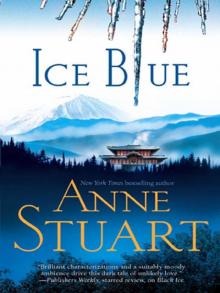 Ice Blue
Ice Blue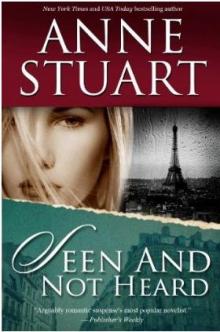 Seen and Not Heard
Seen and Not Heard Never Marry a Viscount
Never Marry a Viscount Heartless
Heartless The Devil's Waltz
The Devil's Waltz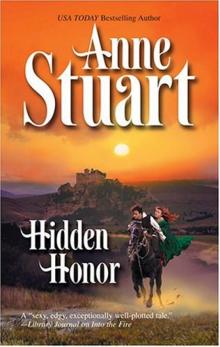 Hidden Honor
Hidden Honor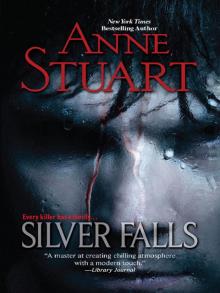 Silver Falls
Silver Falls Fire and Ice
Fire and Ice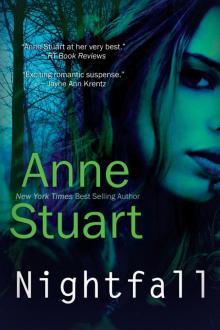 Nightfall
Nightfall Never Trust a Pirate
Never Trust a Pirate The Soldier and the Baby
The Soldier and the Baby Still Lake
Still Lake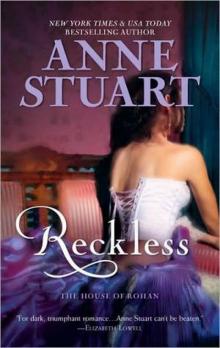 Reckless
Reckless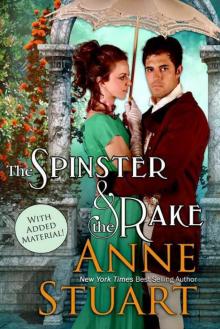 The Spinster and the Rake
The Spinster and the Rake Winter's Edge
Winter's Edge At the Edge of the Sun
At the Edge of the Sun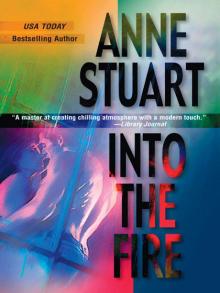 Into the Fire
Into the Fire Night of the Phantom
Night of the Phantom Ritual Sins
Ritual Sins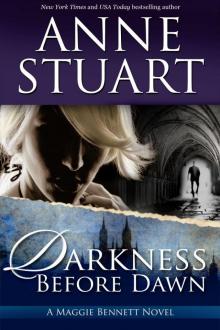 Darkness Before the Dawn
Darkness Before the Dawn Against the Wind
Against the Wind Ruthless
Ruthless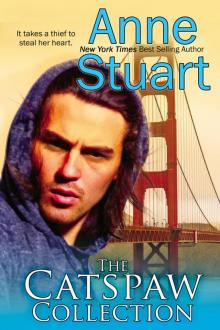 The Catspaw Collection
The Catspaw Collection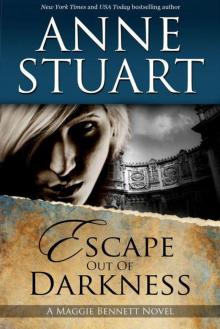 Escape Out of Darkness
Escape Out of Darkness The Widow
The Widow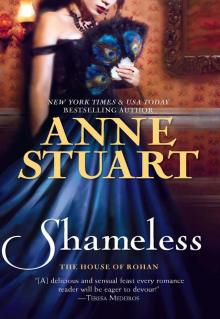 Shameless
Shameless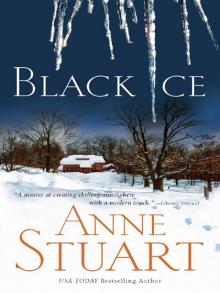 Black Ice
Black Ice Breathless
Breathless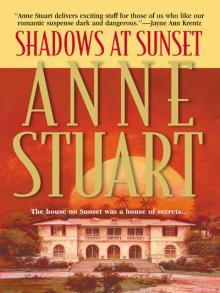 Shadows at Sunset
Shadows at Sunset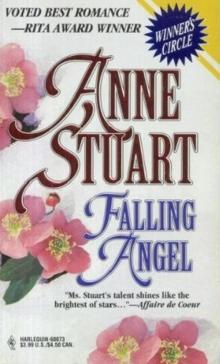 Falling Angel
Falling Angel Housebound
Housebound Cold as Ice
Cold as Ice The Wicked House of Rohan
The Wicked House of Rohan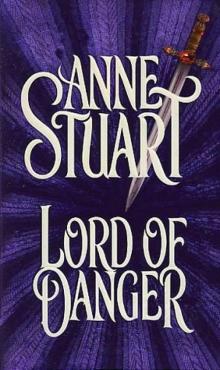 Lord of Danger
Lord of Danger The High Sheriff of Huntingdon
The High Sheriff of Huntingdon Wildfire
Wildfire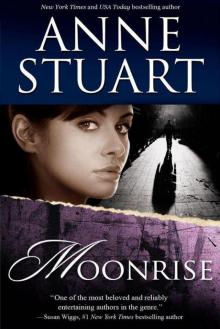 Moonrise
Moonrise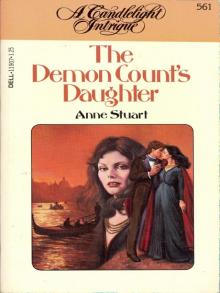 The Demon Count's Daughter
The Demon Count's Daughter Date With a Devil
Date With a Devil To Love a Dark Lord
To Love a Dark Lord Driven by Fire
Driven by Fire Special Gifts
Special Gifts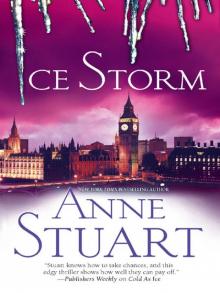 Ice Storm
Ice Storm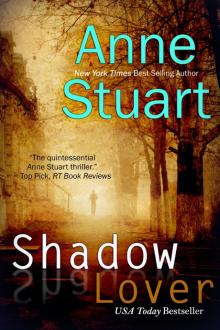 Shadow Lover
Shadow Lover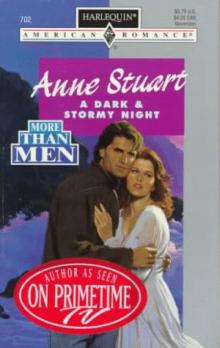 A Dark & Stormy Night
A Dark & Stormy Night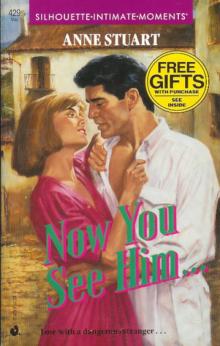 Now You See Him...
Now You See Him...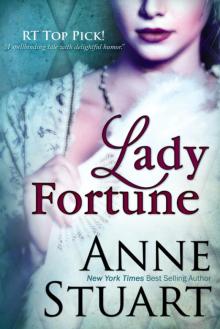 Lady Fortune
Lady Fortune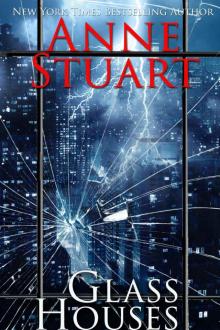 Glass Houses
Glass Houses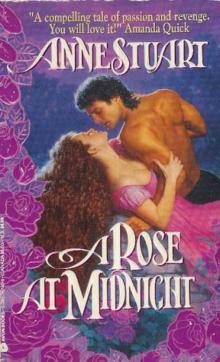 A Rose at Midnight
A Rose at Midnight Prince of Swords
Prince of Swords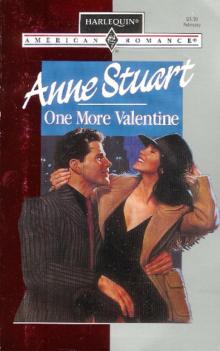 One More Valentine
One More Valentine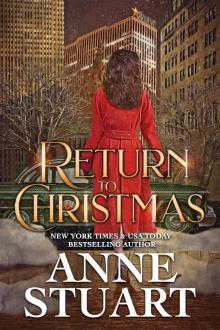 Return to Christmas
Return to Christmas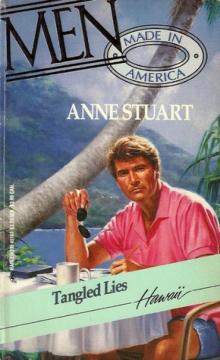 Tangled Lies
Tangled Lies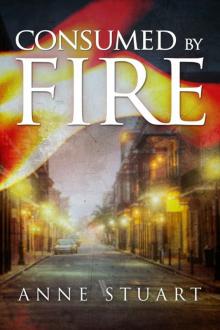 Consumed by Fire
Consumed by Fire The Fall of Maggie Brown
The Fall of Maggie Brown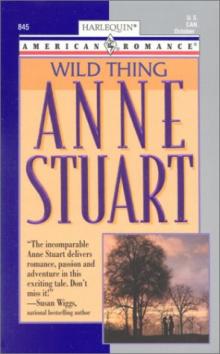 Wild Thing
Wild Thing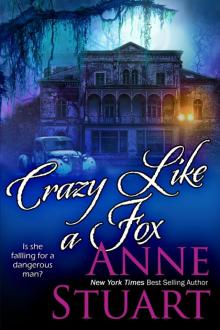 Crazy Like a Fox
Crazy Like a Fox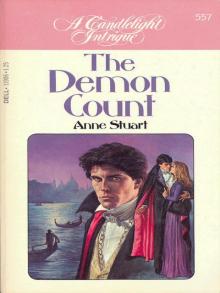 The Demon Count
The Demon Count Prince of Magic
Prince of Magic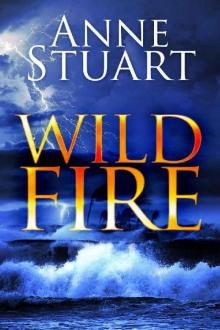 Wildfire (The Fire Series Book 3)
Wildfire (The Fire Series Book 3)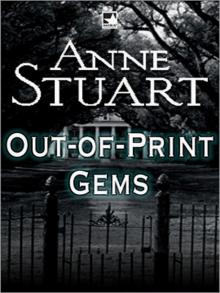 Anne Stuart's Out-of-Print Gems
Anne Stuart's Out-of-Print Gems Shadow Dance
Shadow Dance Under an Enchantment: A Novella
Under an Enchantment: A Novella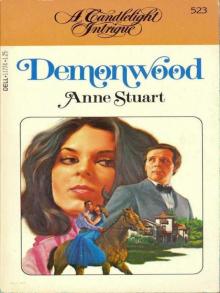 Demonwood
Demonwood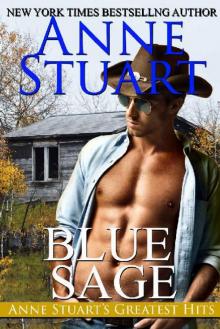 Blue Sage (Anne Stuart's Greatest Hits Book 3)
Blue Sage (Anne Stuart's Greatest Hits Book 3)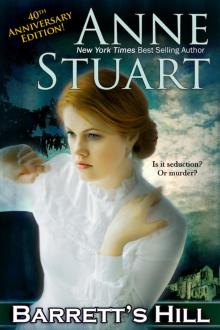 Barrett's Hill
Barrett's Hill Angel's Wings (Anne Stuart's Bad Boys Book 5)
Angel's Wings (Anne Stuart's Bad Boys Book 5)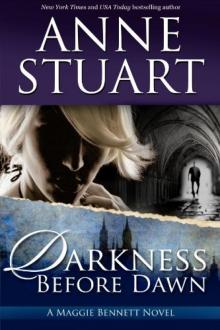 Darkness Before Dawn
Darkness Before Dawn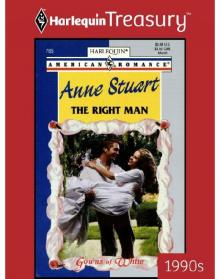 The Right Man
The Right Man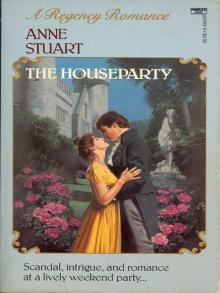 The Houseparty
The Houseparty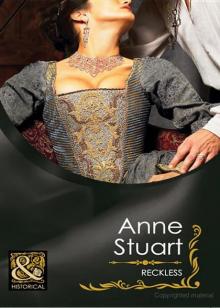 Reckless_Mills & Boon Historical
Reckless_Mills & Boon Historical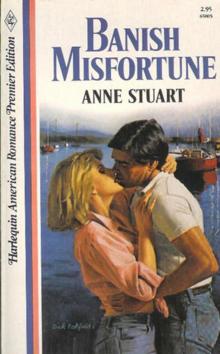 Banish Misfortune
Banish Misfortune Angel's Wings
Angel's Wings Chain of Love
Chain of Love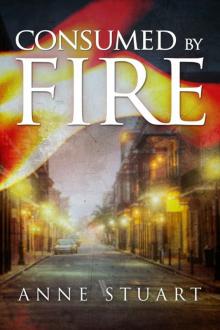 Consumed by Fire (The Fire Series)
Consumed by Fire (The Fire Series)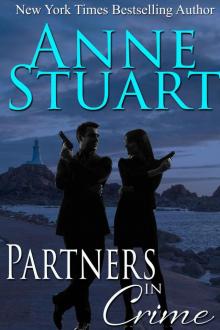 Partners in Crime (Anne Stuart's Bad Boys Book 4)
Partners in Crime (Anne Stuart's Bad Boys Book 4) The Soldier, The Nun and The Baby (Anne Stuart's Greatest Hits Book 2)
The Soldier, The Nun and The Baby (Anne Stuart's Greatest Hits Book 2)